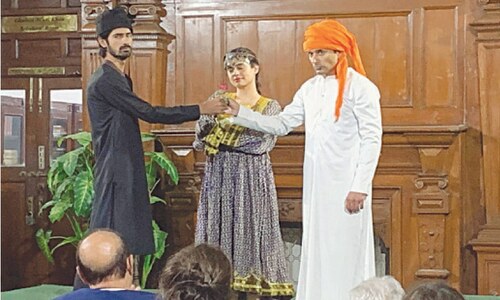Each age has its stories. Most of the stories die out as the age recedes into the past. A few may survive, very few, in fact, if they do at all. What is it that makes certain stories enduring? Why are they transmitted from one generation to the other -- orally or through written word? Do such stories deal with perennial human predicament? If so, it feeds into another question: is there such a thing as perennial human predicament at all? If yes, what do we make of our life, individual and collective, which is always in a state of flux?
We practically live with this paradoxical phenomenon: our life, we know, is a process of change, but there are certain things from the past, near and distant, that we continue to carry not as dead weight, but rather cherished assets. Carl Jung tried to solve the riddle with his well-propounded theory of archetypes. Jung treats archetypes as universal images and patterns deeply buried in the past. They are rooted in the collective human unconscious and are dynamic enough to enter the realm of conscious as images or find expression in human behaviour.
One can look at Puran Bhagat, an ancient legend of the Punjab, from the Jungian perspective. The legend has interesting ingredients: a Raja (king), second polygamous marriage in an old age, an unhappy young queen, sexual passion, irrepressible urge for incest, a false allegation of sexual assault by a stepmother, declaring an innocent young prince guilty and his sentencing to death, compassion of a royal servant, saving of the young prince by a group of yogis, his training in spirituality and, finally, his homecoming as a wandering ascetic are elements that make it shine on the patina of time for generations to come.
The qissa (legend) was penned by poet Qadiryar. A reputable English author, scholar and translator, M Athar Tahir, wrote Qadiryar: A Critical Introduction, which was published by Pakistan Punjabi Adbi Board, Lahore in 1980s giving a critical appraisal of the legend as narrated by Qadiryar.
Recently, another well-known author and translator, Muzaffar A Ghaffaar, rendered Qadiryar’s composition into English. Ghaffaar is an extremely prolific translator. The latest in his series of ‘Masterworks of Punjaabi Sufi Poetry’, we find what he calls Qaadir Yaar, Pooran Bhagat, Within Reach. The book, published by Ferozsons Lahore, contains text in Nastaliq, Gurmukhi and Roman, extensive glossary, poetic translation and line-by-line discourse.
The translator has made the tale even more accessible with extensive glossary and notes on each stanza. Qadiryar is an unpretentious poet who values brevity.
“Qadiryar also uses the rare cut-to-cut technique, where the response to the action of one character is shown on the other, in the same line… one of the subjects, the sexual passion of a stepmother for a stepson, was new when the tale was composed,” says Mr Ghaffaar about the craft and subject matter of the tale.
The sexual passion mentioned above is not “one of the subjects”, but rather the core subject, as everything else springs from it, one can argue. One can also contest the assertion that incestuous passion was something “new when the tale was composed”. Qadiryar chose the tale of Puran because it had been part of our lore for thousands of years, kept alive by oral transmission. In the ruins of Taxila, we find the mound of Raja Sirkapp -- the king who beheads. Sirkapp is the same ruthlessly cunning ruler who Raja Rasalu, the younger brother of Puran, played chess with and defeated.
Let’s now see, for comparison’s sake, how he and Athar Tahir translate a couple of lines of the same stanza. The verses portray the state young Queen Luna is in. “Made the son into her heart’s beloved, from within broke her shame’s integrity/Qadiryar sir the malignant woman, was about to make the stream flow perversely” is how Mr Ghaffaar translates the lines, while Mr Tahir renders the same thus: “In her heart the son becomes the lover/the rope of her constancy snaps in the middle/if such things begin to happen, the sky will be rent, stars fall and chaos reign.”
While refraining from discussing the quality of both the pieces, one feels compelled to raise a point about the text, rather about the variance in the texts used by two scholars. “Both the manuscripts we have used in this book come from oral tradition. The considerable difference between the two available versions would indicate that other versions of the tale may also exist,” writes the translator in the introduction.
But nowhere does he mention the editor of the text he chose to translate. Sadly, classical texts are considered fair game by anybody interested in Punjabi literature. In the editing of the texts generally, the rules and conventions are flouted in such a manner that it becomes a free-for-all. Having said that, one must acknowledge that Mr Ghaffaar has done a wonderful job by introducing Qadiryar to English-reading public.
In modern times, poet Shiv Kumar composed a play in verse, titled Luna, which narrates the story from a perspective of a young woman of low caste married to an aged king against her wishes. The poet subverts the traditional tale in an attempt to rehabilitate Luna, the real protagonist, who, he feels, has been grievously wronged by allegations of lust in a world driven by caste bias and patriarchic morality.
Muzaffaar Ghaffaar’s Puran Bhagat must be in your library if you are interested in peeping inside the forbidden world of arcane passion and mystique of esoteric practices of an indigenous mystic order. — soofi01@hotmail.com
Published in Dawn, December 17th, 2018












































Dear visitor, the comments section is undergoing an overhaul and will return soon.